Domestic Preferences – CBP Says (Again) More Than Software Download Needed to Effect a Substantial Transformation under the Trade Agreements Act
Client Alert | 1 min read | 03.16.15
In a final determination published today, Customs and Border Protection ruled that the last "substantial transformation" (and, hence, the country of origin) of a laptop occurred in a country not "designated" under the Trade Agreements Act when the "base unit" was assembled from principal components (e.g., the CPU and BIOS chip) which were also manufactured in that "non-designated country." Subsequent "download" (which CBP distinguishes from "programming") in a country "designated" under the TAA of critical software necessary for the laptop to function as a computer (e.g.,the BIOS and the Operating System, both of "designated country" origin) were insufficient to substantially transform the laptop and shift the country of origin to the "designated country" and permit sale under GSA Schedule and contracts subject to the TAA.
Contacts
Insights
Client Alert | 6 min read | 02.27.26
The U.S. Supreme Court’s February 20, 2026, opinion in Learning Resources. v. Trump (decided with Trump v. V.O.S. Selections), holding that the President lacks authority to impose tariffs under the International Emergency Economic Powers Act (IEEPA), is notable for many reasons — including its practical impact on the many U.S. companies who paid steep tariffs on global imports and may now be able to recover by filing suit before the Court of International Trade (CIT). That possibility and the key reasons for the High Court’s decision are discussed in our recent alert on this momentous decision.
Client Alert | 4 min read | 02.27.26
New Jersey Expands FLA Protections Effective July 2026: What Employers Need to Know
Client Alert | 3 min read | 02.26.26
Client Alert | 4 min read | 02.26.26



